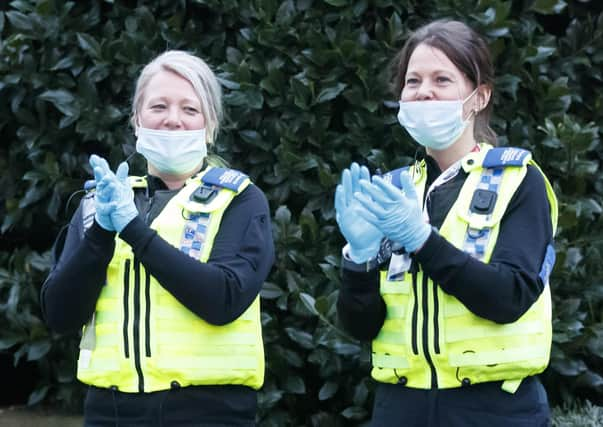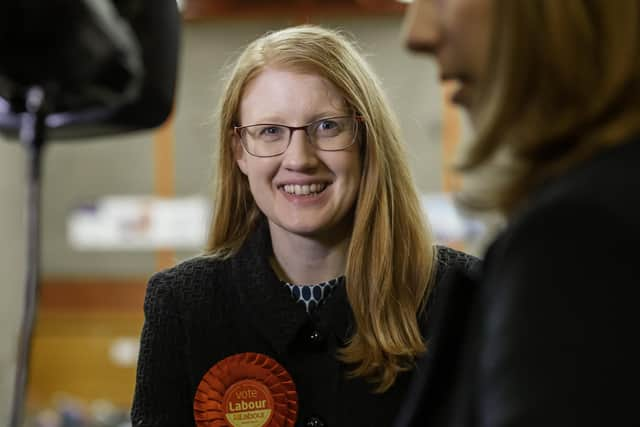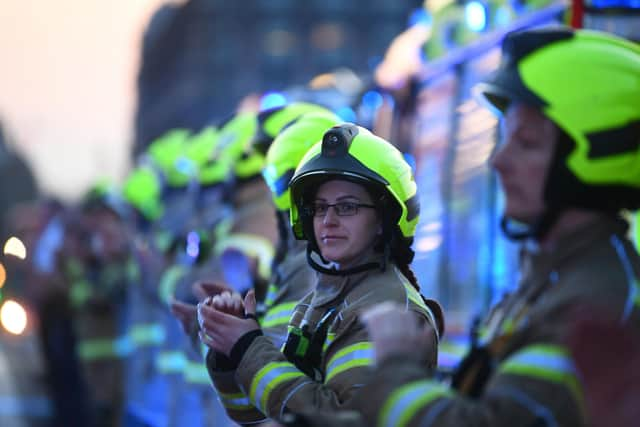Give our police officers PPE and virus tests to keep them safe - Holly Lynch


Last week, the Home Affairs Select Committee took evidence from four of the country’s chief constables, as well as the Police Federation and the Superintendents Association, to hear if the new emergency laws contained within the Coronavirus Act are having the desired effect.
At this challenging time, the police have been tasked with not only maintaining law and order, keeping communities safe with the continuation of day-to-day policing, but also new powers to provide support to their colleagues in the NHS and public health.
Advertisement
Hide AdAdvertisement
Hide AdBut like all of our soldiers on the front line in this war, we need to make sure that they have personal protective equipment to allow them to carry out their vital roles as safely as possible.


We need to roll out virus tests to them as quickly as they are made available to give those officers the confidence they need and deserve, to allay the fear that they might be spreading the virus, or even taking it home to their families.
Since the committee’s evidence session, I’ve been shown internal police guidance which shows that advice around where and when officers need to wear protective face masks changed three times in eight days – this is hardly reassuring for either them or the members of the public they are coming into contact with.
We owe them those protections, not least because we have seen despicable examples of coughing and spitting at officers by some who have claimed to have had the coronavirus.
Advertisement
Hide AdAdvertisement
Hide AdI am pleased to see that this weaponisation of the virus has been met with contempt in the courts with many jail sentences at the higher end of what is possible.


When my colleagues and I originally delivered the ‘Protect the Protectors’ Bill which created the new offence of assaulting an emergency worker, we never imagined it would be needed it this way.
At a time when the criminal justice system has largely been wound down, I am pleased to see that offences committed against emergency workers are still going to court as a priority. I’ve said it so many times before – prosecuting these offences shouldn’t be necessary but where it is necessary, we must prosecute hard.
Inevitably the police have come in for some criticism since the Coronavirus Bill was enacted, with different police forces deploying varying levels of enforcement action.
Advertisement
Hide AdAdvertisement
Hide AdThe drone footage of visitors to the Peak District in Derbyshire – and what were described as ‘road blocks’ in some parts of North Yorkshire – made us all question what was deemed to be ‘lawful’, and what now wasn’t, in these strange new times.
The challenge facing police forces is that the Coronavirus Bill was passed and enacted exceptionally quickly. Months normally pass between a new law receiving Royal Assent and then coming into effect, particularly where a new law creates a new offence.
In the intervening time, the National Police Chiefs Council, the College of Policing and other relevant organisations and experts would have come together to work through any practical challenges.
On this occasion there was a six-day gap between the emergency laws being passed and immediately enforced, and the guidance being finalised. In the intervening time, police forces had to find their own way through.
Advertisement
Hide AdAdvertisement
Hide AdSome teething problems aside, most members of the public understood the spirit of the law and what we collectively needed to achieve.
Forces are now applying the four ‘Es’ – engaging with, explaining and encouraging members of the public in the hope that enforcement is reserved as a last resort.
Coronavirus is changing criminality and, as it reaches its peak, and we see the depressing, predictable spike in domestic violence, online grooming and a rise in break-ins at commercial properties, we will also be faced with a reduced workforce as more and more officers with be required to self-isolate.
West Yorkshire Police currently has around 11 per cent of its officers and staff on sick leave which includes those self-isolating. Whilst this is double the normal sickness rate, it is not at a critical level and efforts to shore up the front line by utilising special constables is being explored here and across the country.
Advertisement
Hide AdAdvertisement
Hide AdThere are a number of things here to keep a close eye on. The uplift in new officers will come too late for this crisis and so – right across the front line – we have to deal with the here and now. With that in mind, every single soldier in this war is invaluable. Let’s do everything within our power to protect them.
Holly Lynch is Labour MP for Halifax and the new Shadow Immigration Minister.
Editor’s note: first and foremost - and rarely have I written down these words with more sincerity - I hope this finds you well.
Almost certainly you are here because you value the quality and the integrity of the journalism produced by The Yorkshire Post’s journalists - almost all of which live alongside you in Yorkshire, spending the wages they earn with Yorkshire businesses - who last year took this title to the industry watchdog’s Most Trusted Newspaper in Britain accolade.
Advertisement
Hide AdAdvertisement
Hide AdAnd that is why I must make an urgent request of you: as advertising revenue declines, your support becomes evermore crucial to the maintenance of the journalistic standards expected of The Yorkshire Post. If you can, safely, please buy a paper or take up a subscription. We want to continue to make you proud of Yorkshire’s National Newspaper but we are going to need your help.
Postal subscription copies can be ordered by calling 0330 4030066 or by emailing [email protected]. Vouchers, to be exchanged at retail sales outlets - our newsagents need you, too - can be subscribed to by contacting subscriptions on 0330 1235950 or by visiting www.localsubsplus.co.uk where you should select The Yorkshire Post from the list of titles available.
If you want to help right now, download our tablet app from the App / Play Stores. Every contribution you make helps to provide this county with the best regional journalism in the country.
Sincerely. Thank you.
James Mitchinson
Editor